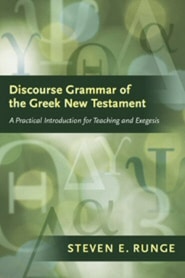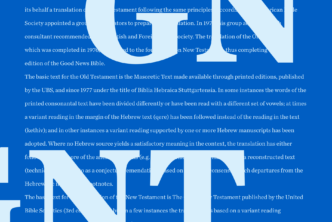Today’s guest post is from Michael Aubrey, on the marketing team.
The name Daniel Wallace is well-known to today’s Greek students. He’s been teaching at Dallas Theological Seminary for years. His invaluable intermediate grammar, Greek Grammar Beyond the Basics, is used in Bible colleges and seminaries all over the world and in more than two thirds of the schools teaching New Testament Greek in the United States. He’s the senior New Testament editor of the NET Bible and the founder of The Center for the Study of New Testament Manuscripts.
Because of Dr. Wallace’s standing in schools and seminaries and his own contributions to Greek grammar, we were so excited when it was confirmed that he would write the foreword to Steve Runge’s Discourse Grammar of the Greek New Testament! Steve had originally written the Discourse Grammar in order to fill a gap. In Wallace’s own preface to Greek Grammar Beyond the Basics, he had written:
“Contrary to the current trend, this work has no chapter on discourse analysis. . . . DA is too significant a topic to receive merely a token treatment, appended as it were to the end of a book on grammar. It deserves its own full-blown discussion, such as can be found in the works of Cotterell and Turner, D. A. Black, and others.”
And yet, those who have picked up Cotterell and Turner’s Linguistics and Biblical Interpretation or D. A. Black’s Linguistics and New Testament Interpretation: Essays on Discourse Analysis know that the authors of these important volumes never intend their work to function as a comprehensive introduction to discourse grammar. The latter is a collection of high quality, but technical essays on specific topics in discourse analysis (which Steve refers to at several points) and the former has as its central focus issues related to hermeneutics and interpretation rather than grammar.” Steve Runge’s Discourse Grammar complements both of these important books by filling in the gap between grammar and interpretation (Cotterell and Turner’s volume) and between traditional grammar and advanced discourse studies (D. A. Black’s book).
And with these realities in mind, we were excited to see these words in Dr. Wallace’s foreword:
This volume is long overdue. Students of the New Testament have been barraged for decades with linguists touting the value of discourse analysis, but few works have demonstrated its importance for exegesis. . . . What Runge has done is to focus on the exegetical significance of discourse grammar for Neutestamenters. He has gathered together several strands of linguistic insights (he calls his approach ‘cross-linguistic’ and ‘function-based’) that are often treated in isolation and sometimes without much more than lip service for exegesis. In short, Runge has made discourse analysis accessible, systematic, comprehensive, and meaningful to students of the New Testament. His presentation is clear, straightforward, and well researched. . . . I have learned a great deal from this volume and will continue to do so for many years. To students of the New Testament, I say, “The time has come. Tolle lege!“
Check out Steve’s Discourse Grammar of the Greek New Testament for yourself, you’ll be glad that you did!





